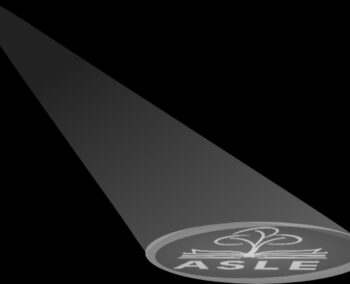Living and Dying in the Anthropocene: Responses in Contemporary Literature from the Western Hemisphere
This special issue of American Literatures (www.amlit.eu) will explore the question: how has the 21st century literature of the Americas responded to the greatest crisis in human history? Given the broad implications of the Anthropocene, contemporary eco-literature intersects with many ideas: ecocriticism, environmental justice, ecofeminism, ecoethics, place, and ethnic—particularly indigenous—literature. This issue of AmLit aims to explore responses to the ecological disasters posed by the Anthropocene in contemporary fiction, poetry, creative nonfiction, and other relevant literary genres. Please send proposals of no more ...
Call for Submissions: ASLE Spotlight 2023
ASLE Spotlight is as program that features the range of wonderful work our members continue to produce in the environmental humanities. The series will be offered both in live video format with audience, and in a recorded format for viewing and listening afterward, occurring monthly this fall. We presently anticipate three or four Spotlight episodes.
As in past years, each event will:
feature moderated conversations with authors/creators of work chosen for thematic coherence across diverse media such as books, films, web projects, exhibits, etc.; include both ...THOREAU’S RELIGION: WALDEN WOODS, SOCIAL JUSTICE, AND THE POLITICS OF ASCETICISM
By Alda Balthrop-Lewis. Cambridge University Press, 2021.
In “Thoreau’s Religion: Walden Woods, Social Justice, and the Politics of Asceticism,” Alda Balthrop-Lewis presents a ground-breaking interpretation of Henry David Thoreau’s seminal work, Walden. Challenging the traditional view of Walden Woods as a solitary wilderness, Balthrop-Lewis demonstrates that Thoreau’s ascetic life was a form of religious practice dedicated to cultivating a just, multispecies community.
This insightful book makes an important contribution to scholarship in religious studies, political theory, English, environmental studies, and critical theory, by offering the ...
A LITTLE BIT OF LAND
By Jessica Gigot. Oregon State University Press, 2022.
In “A Little Bit of Land,” Jessica Gigot explores the intricacies of small-scale agriculture in the Pacific Northwest, the evolving role of women in this traditionally male-dominated industry, and issues of sustainability, economics, and health within our food system. Gigot alternates between sharing the joys and challenges of small farm life and reflecting on her influential experiences outdoors and in classrooms throughout the region—from Ashland in southern Oregon to Washington State’s Skagit Valley. Through her ...
SEA CHANGE: AN ATLAS OF ISLANDS IN A RISING OCEAN
By Christina Gerhardt. University of California Press, 2023.
Sea Change: An Atlas of Islands in a Rising Ocean is a groundbreaking work that invites readers to rethink the challenges faced by low-lying islands amid the devastating impacts of climate change. Christina Gerhardt, a distinguished professor and scholar, masterfully weaves environmental studies, environmental humanities, geography, cartography, and creative nonfiction to reveal the rich histories and cultures of frontline communities, while highlighting diverse actions undertaken to protect and preserve their islands.
Attending to the voices of Indigenous and ...
SYMBIOTIC POSTHUMANIST ECOLOGIES IN WESTERN LITERATURE, PHILOSOPHY AND ART: TOWARDS THEORY AND PRACTICE
Edited by Peggy Karpouzou and Nikoleta Zampaki. Peter Lang, 2023.
In “Symbiotic Posthumanist Ecologies in Western Literature, Philosophy, and Art: Towards Theory and Practice,” Karpouzou and Zampaki bring together discussions from the rapidly growing fields of Posthumanities and Environmental Humanities to examine the transformation of human subjectivity, agency, and citizenship as influenced by the intricate relationship among nature, technology, science, and culture.
The editors introduce an innovative interpretation of the ‘symbiotic turn’—the acknowledgment of the numerous interactions and mutual dependencies between humans, non-humans, and their ...

